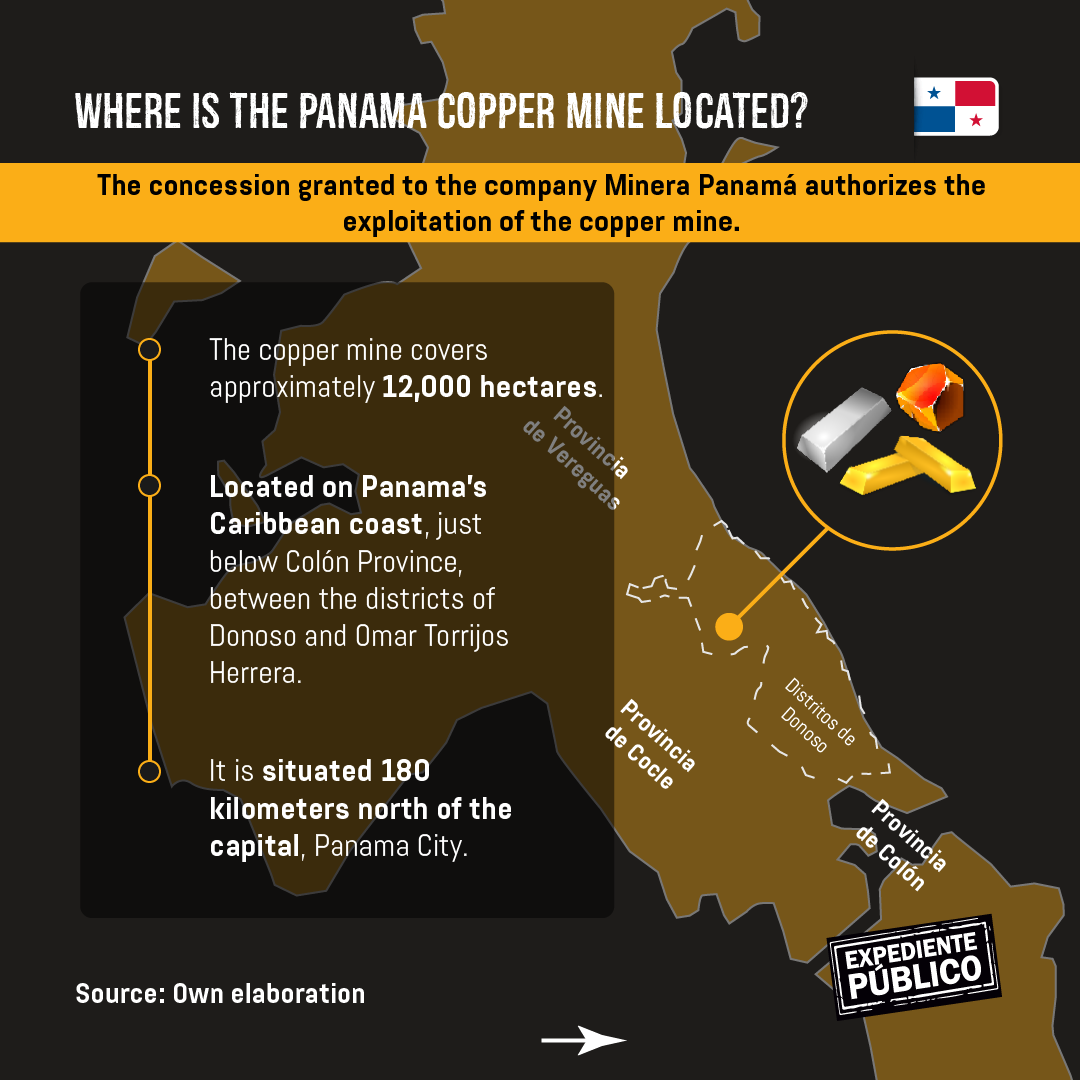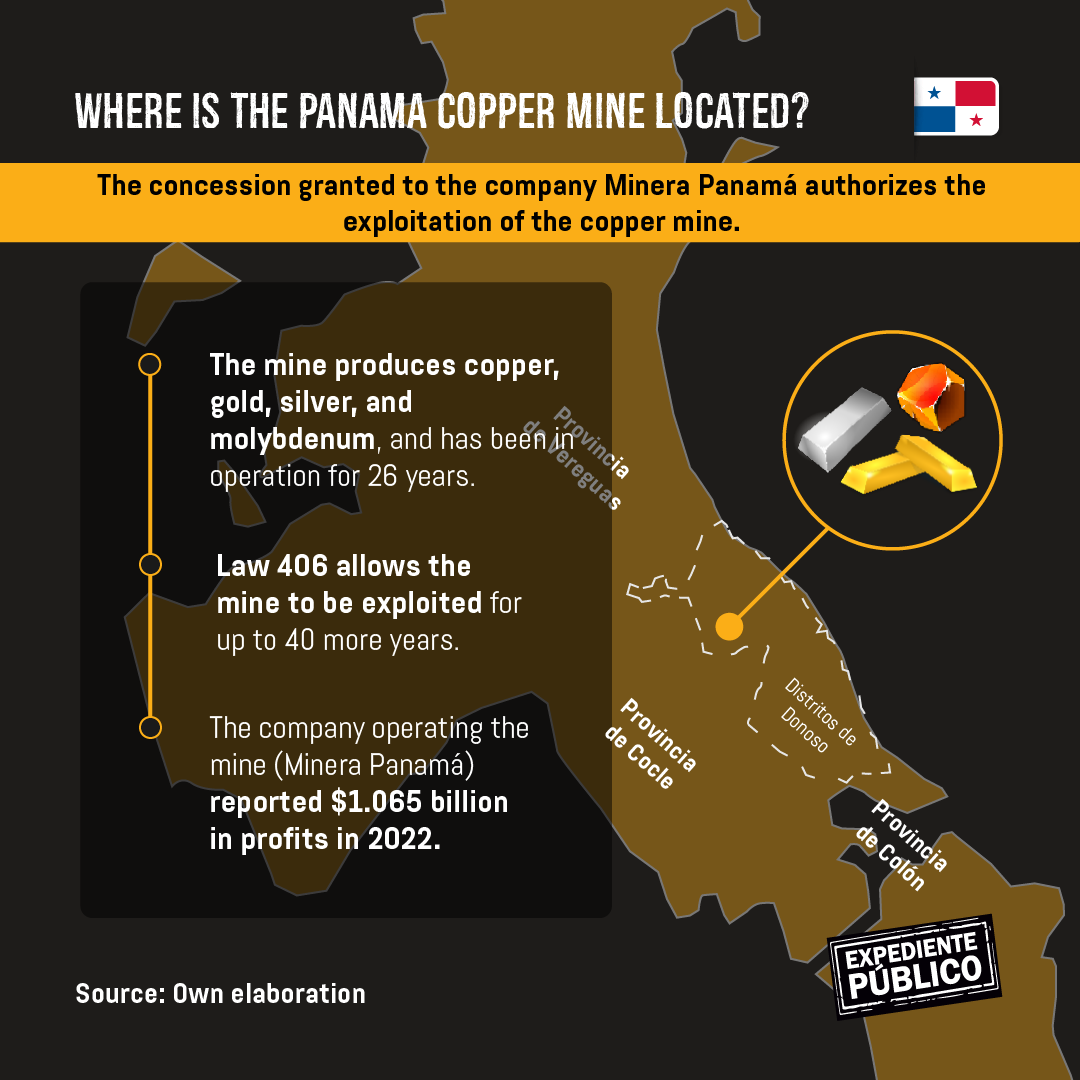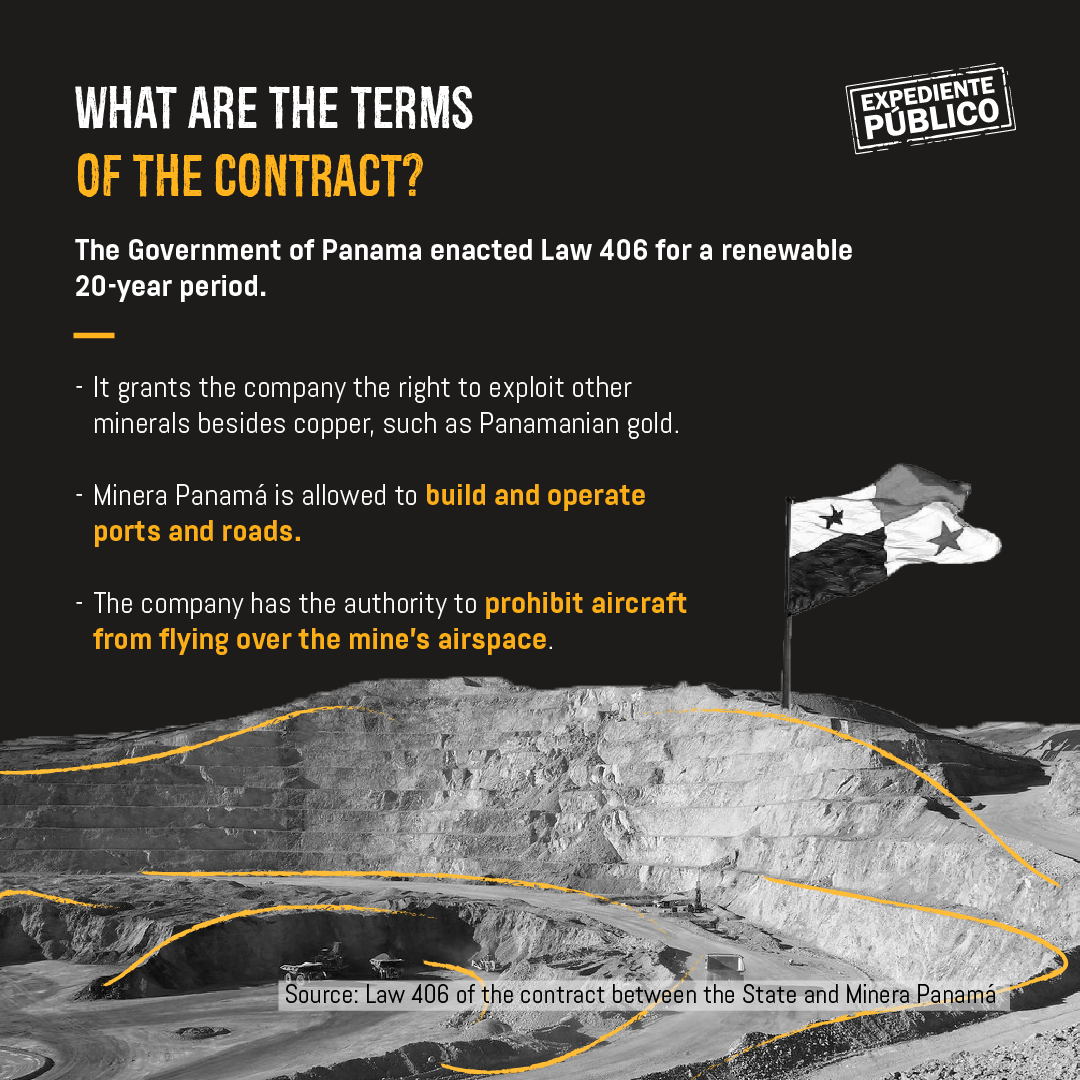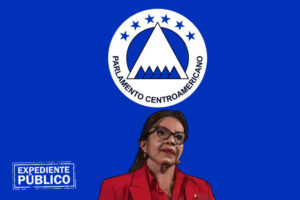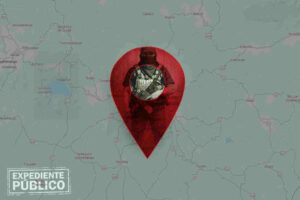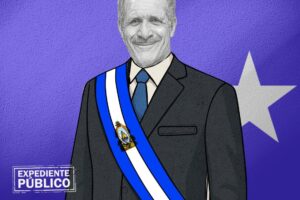* The 20-year renewable mining concession granted to First Quantum Minerals Limited masks the interests of a Chinese company in Panama.
** The Canadian-based company counts Jiangxi Copper Company Limited among its main shareholders.
*** The government of Laurentino Cortizo is pushing for an extension of open-pit mining operations, sparking massive protests that have left three dead and nearly a thousand detained.
Erick Lemus & Yarely Madrid / Expediente Público
The fast-tracked approval of the law enabling continued exploitation of Central America’s largest copper mine triggered widespread discontent among Panamanians toward President Laurentino Cortizo’s administration, which ends in 2024.
Since October 23, 2023, Panamanians—whether organized through unions, professional associations, or grassroots initiatives—have brought the country to a standstill, demanding that Cortizo repeal the law extending Canadian operations for another 20 years, potentially allowing mineral extraction for the next four decades.
The concession granted to Minera Panamá (MPSA) serves the interests of the Canadian firm First Quantum Minerals (FQM), the company’s majority shareholder—but also reflects the influence of the Chinese Communist Party (CCP), which holds stakes within the enterprise.
China is the main buyer of Panama’s copper, and among the majority shareholders of FQM is the operator Jiangxi Copper Company Limited (JCCL).
Subscribe to the Expediente Público newsletter and stay informed with in-depth reporting and updates
Chinese Stakeholders Behind Mining in Panama
Jiangxi Copper Company Limited (JCCL), founded in 1979, controls five major copper mines in Beijing, according to a report by Northeast Securities Co. Ltd. The company’s copper reserves amount to approximately 4.435 million tons, along with 52 tons of gold.
As listed in the MarketScreener database, Jiangxi Copper Company Limited holds the largest share of FQM’s capital. While its stake stood at 18.37% during the week of November 6–10, it dropped slightly to 17.70% by November 13.
A report by Reuters details how one of JCCL’s executives, Wu Yuneng, was dismissed and expelled from the Chinese Communist Party (CCP) in 2019 after it was confirmed that he had illegally accepted gifts and used public funds for personal travel.
The former JCCL director was also sentenced in 2019 to 18 months in prison and fined 2.2 million yuan (approximately USD 302,810.68) after being found guilty of bribery and corruption charges.
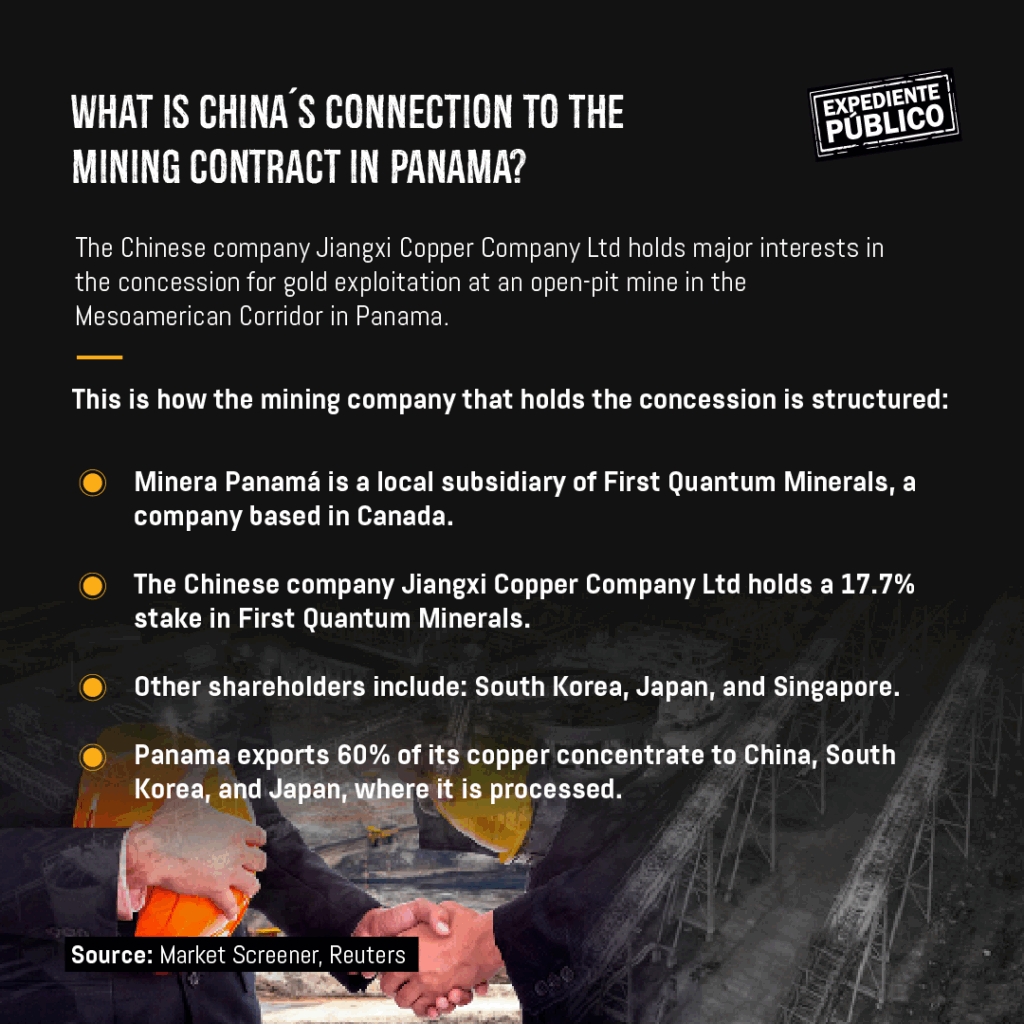
In context: Six years of Panama–China relations have brought few real benefits
China Behind It All
First Quantum operates two open-pit mines in Zambia and Panama, a processing plant, two 150-megawatt power stations, and a port, according to MarketScreener.
FQM is one of several Canadian companies—alongside Teck Resources and Ivanhoe Mines—active in the global mining market, and they all share a key feature: their shareholder lists include state-owned enterprises from the People’s Republic of China (PRC).
The Canadian company specializes in the production of copper, nickel, gold, and silver, and operates mining projects in Zambia, Finland, Turkey, Spain, Australia, Mauritania, and Panama. From Panama, it exports copper mainly to Japan, South Korea, and China.
In 2022, the company extracted at least 776,000 tons of copper, with its main operations based in Zambia and Panama.
Panama’s copper mine is located in the Donoso district, Colón Province, about 120 km west of Panama City. In 2021, the country exported $2.93 million worth of copper, ranking eighth globally in copper mining, according to the Observatory of Economic Complexity (OEC).
Why Are Panamanians Opposed?
In response to mounting protests, President Cortizo signed a moratorium on November 3, 2023, banning the exploration and exploitation of metallic mining. However, the moratorium does not apply to First Quantum’s ongoing operations.
The move failed to quell widespread opposition to Cortizo, who is now facing one of the most severe political crises in Panama’s recent history.
Environmental activist Cholo García told Expediente Público that the main threat posed by the Canadian mining company—whose strongest shareholder is Jiangxi Copper Company—lies in the risk to water resources.
García traces the origins of extractivism to the government of Pérez Balladares, who promoted the original contract for Petaquilla Gold in Colón Province.
“The area where First Quantum operates is the source of many rivers and aquifers. The Republic of Panama has 52 watersheds—18 of them on the Atlantic side, in the Caribbean,” García explains.
He also warns that “all these rivers feed into Lake Gatún, which was built between 1904 and 1914 to supply water to the Panama Canal—and without water, the canal dries up.”
The link to the vital canal has pushed the controversy beyond environmental concerns, reigniting nationalist sentiment across various sectors of Panamanian society, where the government’s actions have been denounced as a betrayal of the nation.
Cancel the Mining Concession
Saúl Méndez Rodríguez, Secretary General of the National Union of Construction and Similar Workers (SUNTRACS), told Expediente Público that President Cortizo has avoided repealing Law 406—the legal instrument under which First Quantum Minerals operates.
Facing the possibility of an international arbitration lawsuit from the mining company, Méndez Rodríguez declared: “We [Panamanians] will have to face First Quantum on whatever terrain necessary, but we cannot be the ‘traitors to the nation’ who sell us out as they have done now.”
He defines “traitors” as those who support the mining company and, in his view, condone violence against protesters.
Union Action in Panama
On November 8, 2023, Méndez—together with 11 other citizens—submitted a bill to the National Assembly to annul the transnational company’s operations. He argues that repealing the law is entirely constitutional.
“In fact, it is a constitutional action. President Cortizo could summon the Legislative Assembly within three days and push through the repeal of Law 406. That is the reality—and the only guarantee for the people that the chaos with Minera Panamá–First Quantum will end is the repeal of the law,” Méndez told Expediente Público.
Also read: Apathy and tolerance have obscured China’s corrupt operations in Panama
“There are media outlets running a campaign of hate, lies, and racism that have called for repression—just like CONEP [the National Council of Private Enterprise], the Mining Chamber, and the Chamber of Commerce, which have been promoting violence,” Méndez laments.
On Tuesday, November 7, two activists were killed on a highway by a man who opened fire on them after they blocked his passage.
Mining: A Historic Problem
The report China’s Influence in Panama by the think tank Expediente Abierto explains that the current crisis has deep roots, dating back to 1997, when Panama signed its first mining contract with Petaquilla S.A. for the extraction of gold, copper, and other minerals.
Later, the Canadian company First Quantum Minerals (FQM), through its subsidiary Minera Panamá S.A., acquired the concession rights and assets of Petaquilla for $60 million.
Panamanian international law expert Alonso Illueca, author of the Expediente Abierto report, told Expediente Público that after President Ernesto Pérez Balladares’s administration (1994–1999) signed the contract with Minera Panamá and the National Assembly ratified it, “it was enacted as a contract-law.”
However, in 2017 Panama’s Supreme Court declared the mining operations unconstitutional, following a legal challenge filed by the Panamanian Center for Environmental Advocacy (CIAM), an institution specializing in strategic litigation.
Yet, because the ruling was not published in the Official Gazette until 2021, First Quantum continued exporting copper uninterrupted during all those years.
Protests Continue
Public road blockades and demonstrations in Panama City and across the provinces have continued for over three weeks. The Canadian mining company still holds a permit to extract and sell copper for 20 years, with the possibility of a 20-year renewal.
The mining operation spans 12,000 hectares within the Mesoamerican Biological Corridor, which begins in Panama and stretches all the way to southern Mexico.
You may be interested in: Fishermen from El Salvador and Guatemala sound the alarm over pollution in Lake Güija
Cultural promoter Dagoberto Chung told Expediente Público that “in the month of the nation, we are in struggle. Three teachers have already been killed while protesting against mining.”
Panama celebrated its national civic holidays on November 4.
As of now, authorities have detained more than 900 people for alleged damage to public and private property. According to the Ministry of Public Security, damage has been reported to 51 government offices, 28 surveillance cameras, 62 businesses, and metro stations.
“There are those who criticize that children are missing school, but when poisoned waters harm their health, when misery takes over Panama, when corruption consumes the country… it won’t just be classes that are lost—it will be lives,” Chung warns.
Profits vs. Environmental Damage
The Cortizo administration claims that the new agreement with the Canadian mining company—backed by Chinese shareholders—will generate $375 million annually in benefits for Panama. However, civil society organizations argue that these revenues are not reflected in public works or in efforts to reduce social inequality.
Cortizo maintains that the new deal is eight times better than the previous one, promising 8,000 direct jobs and 40,000 indirect ones. But the Central American Alliance Against Mining (ACAFREMIN) warns that these benefits do not outweigh the environmental costs of extractive activity.
International law expert Alonso Illueca told Expediente Público that the projected revenue remains low, and such statements are “based on a false equivalence, since previously the state received virtually nothing” from this mining project.
“It’s like saying Panamanians should have been satisfied if the U.S. had paid them $100 million a year for the Canal—when they used to receive just one million. With that kind of mindset, the Canal would never have been returned to Panama,” he illustrated.
Panama Gains Little from Mining Concession
Pedro Cabezas, a representative of ACAFREMIN, told Expediente Público that this situation aligns with long-standing warnings from environmentalists.
“We are in a context where post-pandemic governments are facing a generalized crisis: first, because of global economic demands, and second, because of the consequences this economy has had in the region—particularly the rising international demand for raw materials,” Cabezas explained.
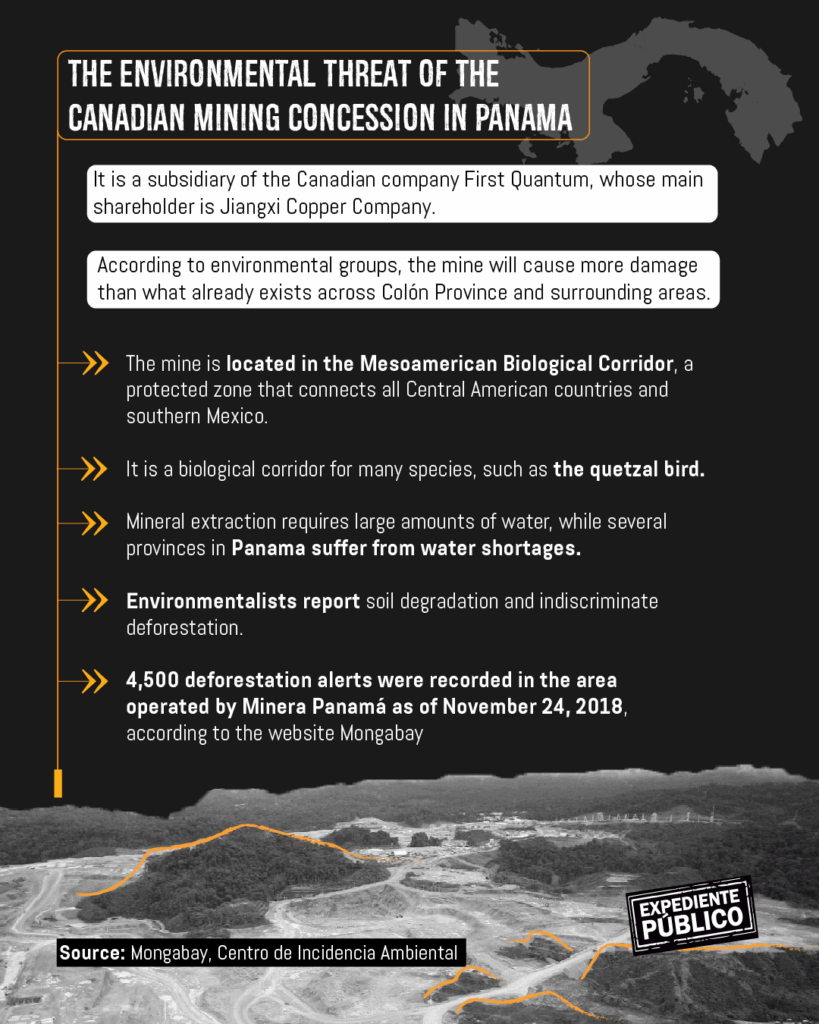
You may be interested in: Environmentalists and anti-mining activists—two ‘sins’ Nayib Bukele does not forgive
“Governments are choosing to solve the post-pandemic crisis by reinforcing extractive models—including mining—while leaning into authoritarianism to suppress resistance to these projects,” adds Pedro Cabezas.
Cabezas closely follows anti-metal mining movements in El Salvador, where environmental activists in the department of Cabañas face intimidation by the government of Nayib Bukele.
Losses for the Business Sector
Zorel Morales, Executive Director of the Panamanian Mining Chamber, warned Expediente Público that shutting down the mine would be a “disaster for the national economy,” since it accounts for 5% of Panama’s Gross Domestic Product.
Illueca acknowledges that “Minera Panamá, like all foreign direct investment, is important for the economy,” but stresses the need to reflect on “this company’s track record in the Democratic Republic of the Congo.”
“Its practices—contrary to human rights, democracy, and transparency—argue against any long-term partnership between Panama and this company,” he contends.
The Mining Chamber representative counters that the company has invested $10 billion in Panama, and in the event of a lawsuit, the state would be required to pay not only that amount, but also “the projected revenues it was expected to receive based on the estimated mineral reserves.”
“We estimate that the lawsuit could range from $50 billion to $100 billion,” Morales claimed.
Mining or Water Resources?
Pedro Cabezas warns that “Central America is caught in a geopolitical tug-of-war between the U.S. and China—two economies competing for resources.”
“We’re aware—and have publicly denounced—China’s interest in the region, particularly in the extraction of natural resources and the acquisition of special economic zones or investments that are not aligned with sustainable development,” says the ACAFREMIN representative.
In context: Tourist pier in El Salvador—US$24 million in undisclosed Chinese investment
“What we truly need is a different development paradigm—one where natural resources are not exploited indiscriminately to serve global markets, but are instead used to promote the sustainable development of local populations,” demands Pedro Cabezas.
Environmental Harm and Intimidation
José Isaac González, director of the environmental organization Sal De Las Redes Panamá, reminds us that the area affected by mining activity is home to endemic species of flora and fauna—species that exist nowhere else.
“What mining does is displace these species from their territory, from their habitat,” he warned.
After more than three weeks of protests, González reports around 93 arrests and an increase in state violence.
“One protester was even injured by the National Police and lost an eye—and with it, his vision,” he revealed.
He also denounced the use of intimidation tactics, including “military personnel near protest areas… and even low-flying aircraft overhead as a show of force.”
Meanwhile, Eliezer Ábrego, president of the San José Verde Foundation (FUSAVE), told Expediente Público that they have detected cyanide contamination in local water sources and confirmed the felling of around 5,000 trees.
“These are massive, irreversible damages. It will take years and years to repair,” the environmentalist warned.


